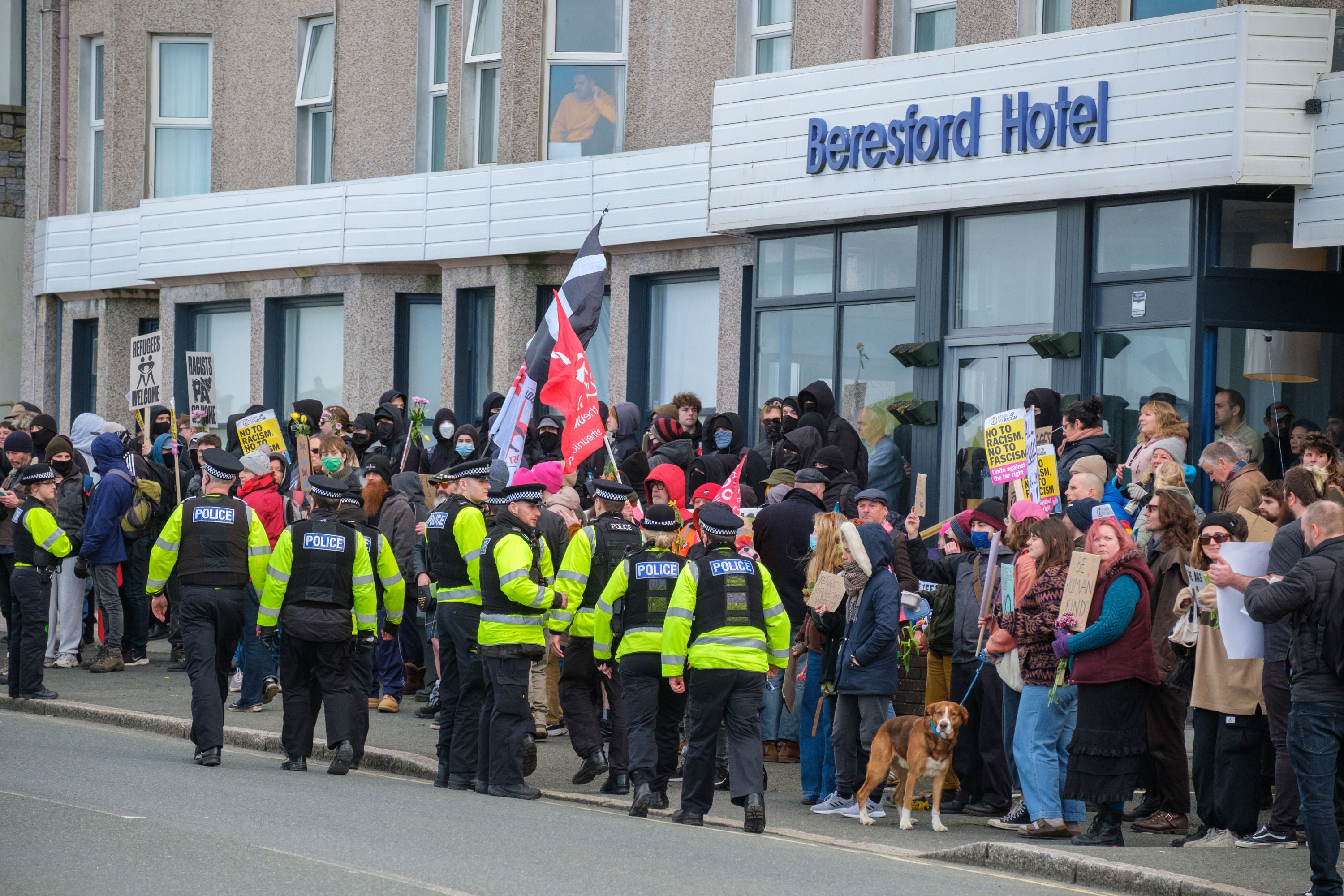Political and Social Tension: How Asylum Hotels Sparked Anti-Immigrant Protests in Britain

“A peak of more than 56,000 asylum seekers were living in the hotels in September 2023.”
This week, Britain witnessed a new wave of tension over the asylum seeker issue, with further protests expected outside hotels designated for housing asylum seekers, amid escalating political, societal, and legal disputes over the continuation of this policy.
Between June 2024 and June 2025, more than 111,084 people applied for asylum in Britain, a 14% annual increase. This is the highest number recorded over a 12-month period since such data began to be recorded in 2001.
Around 32,059 of these asylum seekers were housed in hotels at the end of last June, an 8% annual increase, but a sharp decline from the peak of 56,042 at the end of September 2023, when the Conservative Party was in power.
Previous Conservative governments adopted a policy of housing thousands of asylum seekers in hotels, which cost the government $3.79 billion in 2023-2024, while the Labour government has pledged to end this policy by 2029, considering it too costly.
Recent polls have shown that immigration and asylum issues are a greater concern for Britons than the economy.
On the other hand, right-wing populist parties are already leading organized misleading claims to portray asylum hotels as luxury establishments that drain taxpayers' budgets, promoting theories of an immigrant invasion of the country.
Activists have criticized how asylum seekers have become victims of political polarization, and disrupted immigration plans, exposing them to increased risks and hate crimes, leaving them in a more vulnerable position.
Comprehensive Reform
The Labour government, led by Keir Starmer, is facing growing criticism from the right-wing opposition, local officials, and residents over its continued policy of housing tens of thousands of asylum seekers in hotels, sparking widespread debate about the efficiency and fairness of the asylum system.
More than 50,000 people have arrived in Britain via the English Channel since Starmer became Prime Minister in July 2024.
On August 24, the UK government pledged a comprehensive reform of its asylum system following nationwide protests outside hotels housing migrants over the weekend, with more demonstrations planned.
It announced that it would establish a new independent body to expedite the processing of rejected asylum seeker appeals, as part of its efforts to end the costly use of asylum hotels, which have become a source of resentment among a segment of the population.
As part of the government's plan to expedite the deportation of rejected asylum seekers, the Home Office announced that under the plan, a new committee will handle appeals, in an effort to reduce waiting times from the current average of 53 weeks.
This committee is set to prioritize cases related to residents of taxpayer-funded accommodation, as well as foreign offenders, to examine the validity of the decision to reject their asylum applications at the first stage.
The Home Office has confirmed that court delays in hearing appeals are the biggest cause of pressure on the asylum system.
The government is working hard to reduce the backlog of initial asylum applications and court delays in hearing appeals, which it considers the main cause of pressure on the asylum system.
Home Secretary Yvette Cooper stated in a press release: “The previous Conservative government caused unprecedented chaos in 2022, with 140 additional hotels opening in six months as a result of a loss of control over the asylum system.”
She emphasized that “the Labour government has taken decisive steps, including reducing the backlog of applications, reducing spending on the asylum system by 12%, increasing the deportation of those whose applications were rejected, and reforming the appeal system.”
The government's moves come at a politically sensitive time, amid fears that the crisis could become an electoral bargaining chip that threatens the stability of the Labour government.
Meanwhile, the public is awaiting the effectiveness of these reforms in addressing a escalating crisis that is costing the state billions and provoking deep social divisions.
A recent YouGov poll for The Times showed that more than 70% of Britons believe Prime Minister Keir Starmer is handling the asylum hotels issue incorrectly.

Community Tensions
Britain has witnessed regular protests in recent weeks outside hotels housing asylum seekers, partly due to concerns about public safety after an immigrant staying at a hotel in northeast London was accused of sexually assaulting a 14-year-old girl.
On August 19, the UK High Court ordered the Bell Hotel in Epping Forest to temporarily stop accepting asylum seekers following anti-immigration protests since July, giving the 138 asylum seekers staying there until September 12 to leave.
In its lawsuit, Epping Local Council argued that there was a clear risk of escalating community tensions due to the accommodation of asylum seekers.
Following this, local councils affiliated with the Labour, Conservative, and UK Reform parties announced plans to take similar action.
This ruling has sparked a wave of demonstrations over the past few days outside hotels housing asylum seekers across England, Scotland, and Wales.
These protests have ranged from anti-asylum groups such as ‘Epping Says No’ and ‘Stop the Boats’, to immigrant rights advocates such as Stand Up to Racism, reflecting the growing societal tensions surrounding the issue.

On August 22, the Labour government announced it would appeal the court ruling preventing it from housing asylum seekers at the hotel.
This precedent-setting ruling is a source of concern for the Labour government, which is now legally obligated to provide accommodation for asylum seekers while their claims are processed.
Nigel Farage, the hardline leader of the right-wing British Reform Party, described the court ruling as a huge victory.
He said the ten councils controlled by his party would do everything they could to secure similar rulings.
He called for similar protests outside asylum hotels across the country to pressure local councils to go to court to try to prevent other hotels from housing asylum seekers.
Conservative leader Kemi Badenoch confirmed that her party would support all councils that seek legal action to close asylum hotels.
If other councils win rulings like the Epping case, Starmer’s government could be forced to find alternative accommodation for them within months, and for future asylum seekers.
Despite announcing that he would stop using hotels to house refugees by 2029, Starmer faced widespread criticism after stating last May that the UK could become an island for foreigners. He later expressed regret for his statement.
He emphasized that his government seeks a more humane approach to immigration, but the facts on the ground continue to weigh heavily on this promise.

Far-Right Threats
Recently, asylum hotels in Britain have become flashpoints of hate, amid a rise in far-right anti-immigration rhetoric and debate over the burden the asylum system places on taxpayers.
Home Office data shows that 131 local authorities are involved in housing asylum seekers, with the majority led by the Labour Party. Approximately 210 hotels are used to house approximately 32,000 people.
Asylum seekers and their families are legally allowed to be housed in what is known as contingency accommodation if they are awaiting a decision on their application, or if their application is approved and there is insufficient long-term housing available.
Far-right groups and their supporters in Britain accuse immigrants of threatening the European model of living, obliterating the country's English identity, and increasing crime levels in the areas where they settle.
They have exploited protests sparked by local grievances, leading to demonstrations that have turned violent when members of various far-right groups join them.
Similar patterns have emerged in London's Canary Wharf area, following false rumors that some residents of the Bell Hotel in Epping would be relocated there.
In other cases, right-wing activists organized protests, with calls sent through their online networks for gatherings in several areas of Britain in the coming days.
However, refugee support organizations warned of a growing threat from the far-right, noting that half of all refugee charities operating in this field have been harassed or threatened since the 2024 riots, prompting some to move to less visible locations or close their doors altogether.

Last summer, the UK saw anti-immigrant protests turn violent and overtly racist when misinformation fueled anti-immigration riots across the country.
The murder of three girls in Southport, northern England, in late July 2024 led to protesters later setting fire to the Holiday Inn Express, which housed asylum seekers while they were still inside.
Police were also not spared the violence, with stones, fireworks, and rockets thrown at them on several occasions while they were protecting the asylum seeker shelters.
Sources
- Number of asylum seekers housed in hotels up 8% in a year, Home Office data shows
- Anti-migrant protests continue after government sets out asylum reforms in the UK
- UK says it will reform asylum appeal process to clear backlog as anti-migrant protests outside hotels continue
- The Migration Observatory informs debates on international migration and public policy [Briefing]
- Government struggling to reduce migrant hotel use as asylum claims hit record level [Analysis]










